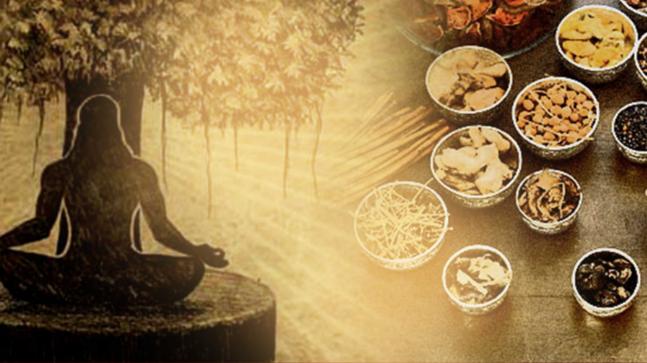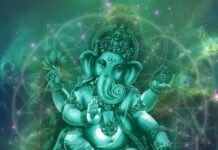In these times of economic and social uncertainty, Yoga and Ayurveda practitioners and schools have faced numerous unpredictable challenges, and often a significant decline in their revenues. After the global shutdown following the initial Covid outbreak, many Yoga Studios had to close, and many were not able to reopen again when the lockdowns were relaxed. Ayurvedic schools and practitioners have faced similar challenges and reductions.
By Dr David Frawley
There has been continued interest in Vedic knowledge at the level of individual study and practice, but it remains at a reduced level in terms of public activity. Even today many Yoga and practitioners of Ayurveda struggle to make their ends meet by their practice alone. This situation makes people wonder whether Yoga and Ayurveda can still provide a viable career for those dedicated to them. David Frawley and U. Mahesh Prabhu try to answer these important questions and presents ways to address the challenges.
Yoga and Ayurveda in the Covid Era
Though the beginning of Covid outbreak caused serious concerns, Yoga & Ayurveda groups and individuals who were able to present their courses and services online were able to hold on. But the ongoing economic sluggishness continued to take its toll. By the beginning of 2022 most Yoga & Ayurveda groups were significantly reduced in number and activity. This was not because interest in these teachings was reduced. In fact, Yoga and Ayurveda were more relevant than ever for individual and collective wellbeing. The problem was the economic decline and the cultural shift towards pharmaceutical medicine to counter the Covid.
Yoga and Ayurveda are only two parts of the greater system of Vedic knowledge, though the most well-known aspects of it. Yet even with these subjects of Yoga and Ayurveda we have only touched upon their surface while the greater system of Vedic knowledge is understood by very few. Yoga and Ayurveda despite their popularity globally also lack credible licensing and recognition at legal and government levels. Ayurveda is still moving slowly in this area, which inhibits their public outreach.
Even with these limitations the interest in Vedic knowledge continues to grow and expand. This is because Vedic knowledge extends beyond the ordinary realm of body and mind, but also encompasses all domains of life. It includes many profound knowledge systems including besides Yoga and Ayurveda, cosmology, ecology, psychology, philosophy, management, economics, leadership, politics, and diplomacy, including all aspects of dharma, right living and right relationship with the whole of life.
When people speak of Yoga today there are usually referring only to a small aspect of Yoga as defined in traditional texts – mainly Yoga as exercise and fitness, with a Yoga class commonly meaning an asana class. Yoga teachers of course know that asana is only an outer part of Yoga, but few can explain or share the deeper and broader aspects Yoga as well. Yoga is better understood as the path of wisdom and Self-realization, one that helps us to manifest our highest potentials and fulfill our Dharma, which includes physical and psychological well-being, prosperity, happiness, and higher consciousness. Yoga provides us the way to strengthen our body and mind so we can understand the ways of the world, assess the nature of situations, and turn them into opportunities. All life is Yoga as it has been said, and Yoga enables us to do anything in life better and more completely, as Yoga provides the energy, attention, and insight to approach every action in the best possible manner, understanding all the factors and energies involved.
While most thinkers speak of how to deal with good or bad situations, Vedic wisdom teaches us to see everything as a potential opportunity for inner growth, depending upon how we approach it. Detached perception is the key to right action. But this objectivity is possible only when we have a calm and focused mind and a healthy and strong body as our basis. Yoga knowledge and practice today remains fixated on the physical focus, which has its place. But modern Yoga groups seldom speak of the mind in any depth and know little about the nature of the consciousness behind and beyond the mind, though this is the essence and goal of Yoga.
Many of us think of consciousness as something unimportant and give little attention to it because it is subtle and formless. But knowing, understanding, and realizing our inmost consciousness is the key to all Vedic disciplines, and addressed in all. That is because consciousness is who we truly are at our inmost core. And if we do not know who we are, how can we know what we should do or what to seek to achieve in life, or know how to avoid suffering or sorrow?
Importance of Vedanta
These fundamental questions about life are clearly addressed by Vedanta, the essence of Vedic knowledge, which most Ayurveda and Yoga groups still little about, though Vedanta provides us the background philosophy of unity behind Yoga and Ayurveda, which along with all Vedic knowledge systems direct us to Self-realization, but Self-realization not merely as a personal or social empowerment but as the realization of unbounded Consciousness within us.
In our new information technology era, we are blindly, haphazardly and quickly taking in unquestioned data and information from the media (social and news) day and night. We are being overstimulated electronically, irritating and distracting our minds and nervous systems, losing our power of focus and attention. We are suffering from multiple emotional issues, including agitation, confusion, stress, fear, insomnia, anxiety and depression. The media tells us about all that is bad in the world, but also that the media itself is beyond reproach and objective in its views, without ulterior motives, when in fact it is one of the main factors disturbing and unbalancing us.
Vedanta teaches us that there are only changing situations and shifting qualities in life, with its various ups and downs and rhythms over time, which can be seen as dangers or opportunities depending upon how we look at them and adjust to them. With the right frame of mind we can achieve sustainable peace and prosperity even in the most difficult times, though we may have to redefine who we are, what we want and recognize the priority of inner realizations over outer achievements and acquisitions for our lasting wellbeing.
Great Vedic sages and Rishis teach us that “For a foot that is wearing the proper footwear it is as if the whole world is covered with carpet. For a mind that is established in peace the whole world presents ongoing opportunities.” Yoga provides us ways to achieve that peace of mind from within through its various aspects and its connections in Ayurveda, Jyotish, Mantra & Meditation.
Fear, stress, and anxiety which come from the mind lead to lifestyle diseases such as hypertension, ulcers, and diabetes. Yet the mind is not the brain. While ailments of the brain can be addressed with medications, ailments of mind cannot be cured by any drug. Anything that ails the mind can only be corrected through counseling and introspection. Vedic knowledge presents Yoga as a profound psychology. Yoga Psychology in turn rests upon a Vedic view of mind and consciousness, the wisdom of the Rishis, not simply on Freud, Jung, or other modern psychology.
To say that Ayurveda and Yoga are losing relevance is like saying that your mind is losing relevance. Vedic knowledge disciplines, including Yoga and Ayurveda, have survived for thousands of years with little outer support or promotion. And Vedic knowledge will continue to survive as long as deeply examining our own minds continues in human life and culture. Of course, ways of presenting, understanding, and realizing this perennial knowledge or the terminology involved can change; but the knowledge itself must remain as in essence it is eternal.
As practitioners of Yoga and Ayurveda, we must be creative and innovative but also imbibe the original teachings and time-proven traditions, and not just hastily create new variants for marketing and self-promotion. Inner discipline and dedication will always remain the key. By revisiting the original teachings of Yoga and the Vedas through the primary source books and gurus who have realized this knowledge, we can adapt this universal knowledge not just for our personal gains but also for the wellbeing of all.
धर्मेचार्थेचकामेच मोक्षेचभरतर्षभ ।
यान्नोहास्तितदन्यत्र तन्नोहास्तिन कुत्रचित् ॥
When it comes to all aspects of life as dharma, achievement, happiness, and realization, what is here may be elsewhere but what is not here cannot be anywhere.
This article first appeared in www.vedanet.com and it belongs to them.








